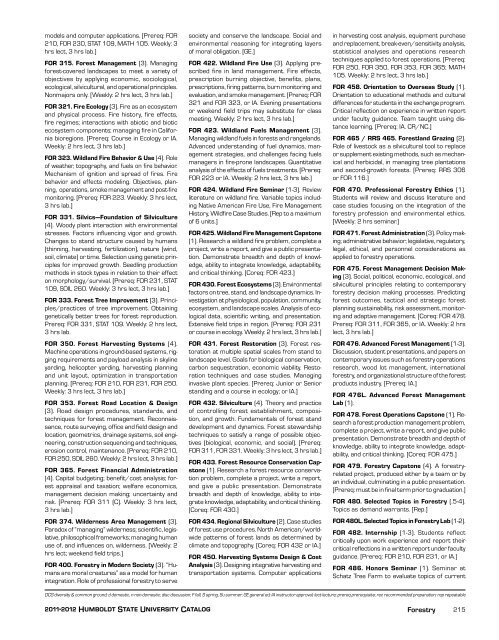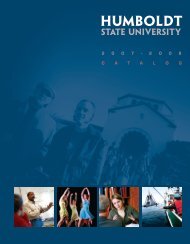2011-12 Academic Year - Bad Request - Humboldt State University
2011-12 Academic Year - Bad Request - Humboldt State University
2011-12 Academic Year - Bad Request - Humboldt State University
You also want an ePaper? Increase the reach of your titles
YUMPU automatically turns print PDFs into web optimized ePapers that Google loves.
models and computer applications. [Prereq: FOR<br />
210, FOR 230, STAT 109, MATH 105. Weekly: 3<br />
hrs lect, 3 hrs lab.]<br />
FOR 315. Forest Management (3). Managing<br />
forest-covered landscapes to meet a variety of<br />
objectives by applying economic, sociological,<br />
ecological, silvicultural, and operational principles.<br />
Nonmajors only. [Weekly: 2 hrs lect, 3 hrs lab.]<br />
FOR 321. Fire Ecology (3). Fire as an ecosystem<br />
and physical process. Fire history, fire effects,<br />
fire regimes; interactions with abiotic and biotic<br />
ecosystem components; managing fire in California<br />
bioregions. [Prereq: Course in Ecology or IA.<br />
Weekly: 2 hrs lect, 3 hrs lab.]<br />
FOR 323. Wildland Fire Behavior & Use (4). Role<br />
of weather, topography, and fuels on fire behavior.<br />
Mechanism of ignition and spread of fires. Fire<br />
behavior and effects modeling. Objectives, planning,<br />
operations, smoke management and post-fire<br />
monitoring. [Prereq: FOR 223. Weekly: 3 hrs lect,<br />
3 hrs lab.]<br />
FOR 331. Silvics—Foundation of Silviculture<br />
(4). Woody plant interaction with environmental<br />
stresses. Factors influencing vigor and growth.<br />
Changes to stand structure caused by humans<br />
(thinning, harvesting, fertilization), nature (wind,<br />
soil, climate) or time. Selection using genetic principles<br />
for improved growth. Seedling production<br />
methods in stock types in relation to their effect<br />
on morphology/survival. [Prereq: FOR 231, STAT<br />
109, SOIL 260. Weekly: 3 hrs lect, 3 hrs lab.]<br />
FOR 333. Forest Tree Improvement (3). Principles/practices<br />
of tree improvement. Obtaining<br />
genetically better trees for forest reproduction.<br />
Prereq: FOR 331, STAT 109. Weekly: 2 hrs lect,<br />
3 hrs lab.<br />
FOR 350. Forest Harvesting Systems (4).<br />
Machine operations in ground-based systems, rigging<br />
requirements and payload analysis in skyline<br />
yarding, helicopter yarding, harvesting planning<br />
and unit layout, optimization in transportation<br />
planning. [Prereq: FOR 210, FOR 231, FOR 250.<br />
Weekly: 3 hrs lect, 3 hrs lab.]<br />
FOR 353. Forest Road Location & Design<br />
(3). Road design procedures, standards, and<br />
techniques for forest management. Reconnaissance,<br />
route surveying, office and field design and<br />
location, geometrics, drainage systems, soil engineering,<br />
construction sequencing and techniques,<br />
erosion control, maintenance. [Prereq: FOR 210,<br />
FOR 250, SOIL 260. Weekly: 2 hrs lect, 3 hrs lab.]<br />
FOR 365. Forest Financial Administration<br />
(4). Capital budgeting; benefit/cost analysis; forest<br />
appraisal and taxation; welfare economics,<br />
management decision making; uncertainty and<br />
risk. [Prereq: FOR 311 (C). Weekly: 3 hrs lect,<br />
3 hrs lab.]<br />
FOR 374. Wilderness Area Management (3).<br />
Paradox of “managing” wilderness; scientific, legislative,<br />
philosophical frameworks; managing human<br />
use of, and influences on, wilderness. [Weekly: 2<br />
hrs lect; weekend field trips.]<br />
FOR 400. Forestry in Modern Society (3). “Humans<br />
are moral creatures” as a model for human<br />
integration. Role of professional forestry to serve<br />
DCG diversity & common ground; d domestic, n non-domestic; disc discussion; F fall, S spring, Su summer; GE general ed; IA instructor approval; lect lecture; prereq prerequisite; rec recommended preparation; rep repeatable<br />
<strong>2011</strong>-20<strong>12</strong> <strong>Humboldt</strong> <strong>State</strong> <strong>University</strong> Catalog<br />
society and conserve the landscape. Social and<br />
environmental reasoning for integrating layers<br />
of moral obligation. [GE.]<br />
FOR 422. Wildland Fire Use (3). Applying prescribed<br />
fire in land management. Fire effects,<br />
prescription burning objective, benefits, plans,<br />
prescriptions, firing patterns, burn monitoring and<br />
evaluation, and smoke management. [Prereq: FOR<br />
321 and FOR 323, or IA. Evening presentations<br />
or weekend field trips may substitute for class<br />
meeting. Weekly: 2 hrs lect, 3 hrs lab.]<br />
FOR 423. Wildland Fuels Management (3).<br />
Managing wildland fuels in forests and rangelands.<br />
Advanced understanding of fuel dynamics, management<br />
strategies, and challenges facing fuels<br />
managers in fire-prone landscapes. Quantitative<br />
analysis of the effects of fuels treatments. [Prereq:<br />
FOR 223 or IA. Weekly: 2 hrs lect, 3 hrs lab.]<br />
FOR 424. Wildland Fire Seminar (1-3). Review<br />
literature on wildland fire. Variable topics including<br />
Native American Fire Use, Fire Management<br />
History, Wildfire Case Studies. [Rep to a maximum<br />
of 6 units.]<br />
FOR 425. Wildland Fire Management Capstone<br />
(1). Research a wildland fire problem, complete a<br />
project, write a report, and give a public presentation.<br />
Demonstrate breadth and depth of knowledge,<br />
ability to integrate knowledge, adaptability,<br />
and critical thinking. [Coreq: FOR 423.]<br />
FOR 430. Forest Ecosystems (3). Environmental<br />
factors on tree, stand, and landscape dynamics. Investigation<br />
at physiological, population, community,<br />
ecosystem, and landscape scales. Analysis of ecological<br />
data, scientific writing, and presentation.<br />
Extensive field trips in region. [Prereq: FOR 231<br />
or course in ecology. Weekly: 2 hrs lect, 3 hrs lab.]<br />
FOR 431. Forest Restoration (3). Forest restoration<br />
at multiple spatial scales from stand to<br />
landscape level. Goals for biological conservation,<br />
carbon sequestration, economic viability. Restoration<br />
techniques and case studies. Managing<br />
invasive plant species. [Prereq: Junior or Senior<br />
standing and a course in ecology; or IA.]<br />
FOR 432. Silviculture (4). Theory and practice<br />
of controlling forest establishment, composition,<br />
and growth. Fundamentals of forest stand<br />
development and dynamics. Forest stewardship<br />
techniques to satisfy a range of possible objectives<br />
(biological, economic, and social). [Prereq:<br />
FOR 311, FOR 331. Weekly: 3 hrs lect, 3 hrs lab.]<br />
FOR 433. Forest Resource Conservation Capstone<br />
(1). Research a forest resource conservation<br />
problem, complete a project, write a report,<br />
and give a public presentation. Demonstrate<br />
breadth and depth of knowledge, ability to integrate<br />
knowledge, adaptability, and critical thinking.<br />
[Coreq: FOR 430.]<br />
FOR 434. Regional Silviculture (2). Case studies<br />
of forest use procedures. North American/worldwide<br />
patterns of forest lands as determined by<br />
climate and topography. [Coreq: FOR 432 or IA.]<br />
FOR 450. Harvesting Systems Design & Cost<br />
Analysis (3). Designing integrative harvesting and<br />
transportation systems. Computer applications<br />
in harvesting cost analysis, equipment purchase<br />
and replacement, break-even/sensitivity analysis,<br />
statistical analyses and operations research<br />
techniques applied to forest operations. [Prereq:<br />
FOR 250, FOR 350, FOR 353, FOR 365; MATH<br />
105. Weekly: 2 hrs lect, 3 hrs lab.]<br />
FOR 458. Orientation to Overseas Study (1).<br />
Orientation to educational methods and cultural<br />
differences for students in the exchange program.<br />
Critical reflection on experience in written report<br />
under faculty guidance. Team taught using distance<br />
learning. [Prereq: IA. CR/NC.]<br />
FOR 465 / RRS 465. Forestland Grazing (2).<br />
Role of livestock as a silvicultural tool to replace<br />
or supplement existing methods, such as mechanical<br />
and herbicidal, in managing tree plantations<br />
and second-growth forests. [Prereq: RRS 306<br />
or FOR 116.]<br />
FOR 470. Professional Forestry Ethics (1).<br />
Students will review and discuss literature and<br />
case studies focusing on the integration of the<br />
forestry profession and environmental ethics.<br />
[Weekly: 2 hrs seminar.]<br />
FOR 471. Forest Administration (3). Policy making;<br />
administrative behavior; legislative, regulatory,<br />
legal, ethical, and personnel consider ations as<br />
applied to forestry operations.<br />
FOR 475. Forest Management Decision Making<br />
(3). Social, political, economic, ecological, and<br />
silvicultural principles relating to contemporary<br />
forestry decision making processes. Predicting<br />
forest outcomes, tactical and strategic forest<br />
planning sustainability, risk assessment, monitoring<br />
and adaptive management. [Coreq: FOR 478.<br />
Prereq: FOR 311, FOR 365, or IA. Weekly: 2 hrs<br />
lect, 3 hrs lab.]<br />
FOR 476. Advanced Forest Management (1-3).<br />
Discussion, student presentations, and papers on<br />
contemporary issues such as forestry operations<br />
research, wood lot management, international<br />
forestry, and organizational structure of the forest<br />
products industry. [Prereq: IA.]<br />
FOR 476L. Advanced Forest Management<br />
Lab (1).<br />
FOR 478. Forest Operations Capstone (1). Research<br />
a forest production management problem,<br />
complete a project, write a report, and give public<br />
presentation. Demonstrate breadth and depth of<br />
knowledge, ability to integrate knowledge, adaptability,<br />
and critical thinking. [Coreq: FOR 475.]<br />
FOR 479. Forestry Capstone (4). A forestryrelated<br />
project, produced either by a team or by<br />
an individual, culminating in a public presentation.<br />
[Prereq: must be in final term prior to graduation.]<br />
FOR 480. Selected Topics in Forestry (.5-4).<br />
Topics as demand warrants. [Rep.]<br />
FOR 480L. Selected Topics in Forestry Lab (1-2).<br />
FOR 482. Internship (1-3). Students reflect<br />
critically upon work experience and report their<br />
critical reflections in a written report under faculty<br />
guidance. [Prereq: FOR 210, FOR 231, or IA.]<br />
FOR 486. Honors Seminar (1). Seminar at<br />
Schatz Tree Farm to evaluate topics of current<br />
Forestry<br />
215

















